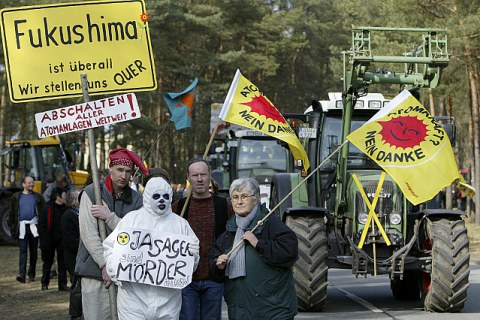"Fukushima is everywhere", demo in Gorleben (click here for more pictures).
German opponents of nuclear energy have protested and will protest in response to the nuclear mishaps caused in Japan by the earthquake and tsunami. Click here for a list of where protests are happening or have happened.
On Saturday 60,000 people took part in a human chain (YouTube) between the city of Stuttgart and the Neckarwestheim nuclear power station to protest against the pro-nuclear stance of the conservative-led government of Chancellor Angela Merkel. The demo had been planned for a long time.
Germany has 17 nuclear power stations in operation whose running times the government has just extended by 12 years on average, stirring outrage among two out of three Germans who want nuclear power ended.
Postings on German IndyMedias expect the worst expectable, Chernobyl-scale disaster to happen in Japan. “Several Japanese nuclear stations are out of control,” notes one from Cologne, adding that information is being withheld.
“Whenever something like this happens, that we have always warned about, the anti-nuclear movement gets a bit more attention. And we’ll use that, we’ll rally at 6 pm Monday on the Rudolfplatz in Cologne because we are fed up to the back teeth.”
“Japan claims to have the world’s safest nuclear stations – a claim that shows yet again that there will never be safe nuclear power stations. They are always ticking time bombs. And for the whole time they operate they emit radiation to their surroundings which always causes illness and genetic damage in all of nature. No nuclear installation, wherever it was, has ever been really safe.”
The people resisting nuclear waste dumping in Gorleben demanded that all nuclear plants be shut down immediately at last.
“Mixed in with German nuclear opponents’ great concern for the people of Japan there is the horror about the reaction of politicians in Berlin at their verbal reflex that no such catastrophe could happen in Germany.”
"Human mistakes, natural disasters, material fatigue – nuclear technology is a high-risk technology, on top of which comes the danger emanating from radioactive waste that has to be safely disposed of for a million years.
The only thing that is certain is that nothing is safe, which is why we demand abandonment of nuclear energy worldwide. Switch the reactors off at last!”
On Saturday 12 March a handful of Gorlebeners dedicated a stroll around the proposed underground waste dump to the people in Fukushima (which means “happy island”). About 15 people and a few dogs took part. At a larger demo is planned for 1 pm on Sunday. (Update on Gorleben below.)
In Freiburg activists are taking a cynical tack by calling for a 2 pm Sunday turnout on Stühlingerpark to celebrate the “safety” of German nukes.
“The fact that the huge earthquake in Japan did not damage a single German nuclear power station testifies to the stability of German technology and the safety of German nuclear power stations. As a contribution to more humanity in the world, the demo will call for increased exportation of German atomic technology and even more clearly expand Germany as a location for safety and nuclear technology research.”
A demo is being called for Monday at 6 pm in Wuppertal-Elberfeld at Alte Freiheit/ Mina Knallenfalls “to show our consternation and solidarity with the people of Japan.” “Into the stress! Against longer running times for the nukes! We demand that all atomic installations be switched off.”
A number of events have been announced for Berlin. It’s noted that that will split the potential impact.
In Hamburg a demo took place at 6 pm on Saturday. “Solidarity with the irradiated, dead and missing in Japan! Solidarity with all activists who have put up resistance for years and will continue to do so. We want enraged but peaceful demonstrations and resistance against nuclear power everywhere! We want no state repression, like there was in the 2010 waste transport to Gorleben. We call on police to join the peaceful protest.”
In Lüneburg about 100 people marched through the centre on Saturday afternoon.
For noon on Sunday a demo was called at the Bochum central railway station "against the further use of nucxlear energy for power or weapons".
The Environment Civic Action Alliance (BBU) has called for vigils throughout the country at 6 pm Monday (9 am in Qld).
Gorleben update
More than 400 activists occupied the compound housing the salt mine earmarked as Germany’s final nuclear waste repository. It began with farmers’ tractors blocking the entrance to the nearby interim storage hall.
After a spontaneous assembly the gates of the mine grounds were opened and the grounds occupied.
In contrast to Japan’s dependency on nuclear power, Germany is in a comfortable energy position, said the local resistance group, BI. It quotes these figures:
In the first quarter of 2010 Germany achieved the highest electricity export in its history, more than nine billion kilowatt-hours. 6.7% more power was produced than consumed, although two nukes, Krümmel and Brunsbüttel, did not produce a single kilowatt-hour because they’ve long been off-stream for repairs.
The export surplus matched pretty precisely the volume produced by the old Biblis A and B, Neckarwestheim I, Isar 1, Philippsburg 1 and Grafenrheinfeld nukes.
That means Germany could have done without these eight nukes immediately and still have had had sufficient energy.
“Even if Germany gave up nuclear power altogether, the lights wouldn’t go out, whereas they certainly would in a catastrophe,” wrote Wolfgang Ehmke for the BI.

